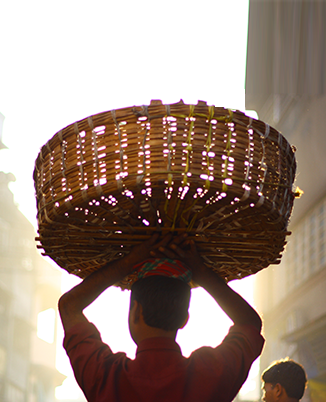
DATE: 24th October 2018
CULTURE MAPPING: The Power of the Articulate Symbol
Using Geert Hofstede's Onion Model we will attempt to map certain key dimensions of cultural change in India by observing, decoding and synthesising signs that lie scattered all around us. The attempt of the exercise will be to pick the more articulate amongst the signs and to read them, individually and collectively to build a composite picture of the cultural impulses that drive change. The day begins with a short orientation about the framework and some guidelines on the prices itself.
THE WALK:
We will set on a culture walk across the streets of Lower Parel. Dominated by textile mills until the 1980s, Lower Parel has now morphed into a posh locality as part of the redevelopment of Mumbai mills. While one part of the area does still embrace industrial estates, housing its original resident mill-workers & their eco-system, another part is adorned with newly arrived luxury skyscraper apartments, upscale restaurants and pubs, premium office space, luxury hotels, and boutiques. Lower Parel is a microcosm of change, and the ideal spot for delving into the narrative of culture; how it was, is, and will be.
Participants will be segregated in groups, of which each will observe and explore a different section of the area. The primary task is to set on foot, take in Mumbai, and capture and assimilate indicators of change; artefacts, street signs, advertising, photographs and journal entries that indicate the coming together of the old and the new. Right from a quirky window curtain to a modernised women’s salon, we can see the narrative of change within shops, houses, signages and objects. Anything that inspires you, pop culture references that stay with you, or the language that affect you while on the walk; capture it.
THE WORKSHOP:
Our walk will end at the workshop venue where we will unearth larger trends that signal towards an evolving society. Participants will work in groups, laying down observations, decoding the material, and creating meaning out of it all using the Hofstede Model.
With uniquely Indian contexts to many of evidences collected, the walk and subsequently the workshop will be an ideal and quick entry into the Indian ecosystem and the change therein, for both local as well as international audiences.
DIRECTIONS:
The orientation session venue: The Dy Works office
Mathuradas Mill Compound.
Benefice Business House 3rd floor,
NM Joshi Marg, Lower Parel, Mumbai,
Maharashtra 400013
How to reach there:
We recommend making use of public transportation as much as possible, since there is no space reserved in the premises for visitors. Below are the modes of transportation you can make use of:
Book a cab:
You may input ‘Benefice Business House’ in your booking app i.e. Ola / Uber, and it’ll direct you straight to the venue. In case you take a ‘black and yellow’ cab, ask for Todi Mills compound, Lower Parel, where ‘Benefice Business House’ is located. Please map it on Google Maps to ensure that you reach the correct location.
Train:
Take the Western Line train to Lower Parel Railway station. To make your transit easier, we suggest you download the app ‘M-Indicator’ on your smartphones. This app provides a detailed minute-by-minute schedule of all the trains.
Click here for directions from Lower Parel station to the Dy Works office. It’s a short 4-minute walk.
The workshop venue: Rise, Mumbai
#1902, 19th floor - Tower B.
Peninsula Business Park,
Ganpatrao Kadam Marg, Lower Parel,
Mumbai, 400013
After the culture walk, you will be led to the workshop venue by the Semiofest team.

ABOUT THE SPEAKER
Santosh Desai is a columnist, media critic and the author of ‘Mother Pious Lady: Making Sense of Everyday India’. In his professional life, Santosh is the MD & CEO of Futurebrands, a brand and consumer consultancy company and has previously headed an advertising agency. Santosh’s principal area of interest lies in examining the evolving nature of consumer culture in India. Along with being a thought leader in understanding the relationship between culture and brands and the consumer as a product of his or her cultural context, he also authors ‘City City Bang Bang’, a weekly column in The Times of India. He is the promoter of DY Works and is widely respected in the country.
DATE: 25th October 2018
| 9.30 -10.00 | Registrations | ||
| 10.00 - 10.15 | Welcome & Introduction | ||
| 10.15 - 11.00 | Key note: Understanding and deciding symbols of Sanatan: The Hindu notion of fragility | by Devdutt Pattanaik | |
| 11.00 - 11.20 | Plotting the trajectory of socio-cultural change in India: The relevance of the long view | by Hamsini Shivakumar | |
| 11.20 - 11.40 | Metanoia of Semiotic Analyses – Representation and Mediation at Individual and Collective levels for Marketing Effectiveness |
by Anirban Chaudhary | |
| 11.40 - 12.00 | Break | ||
| 12.00 - 12.20 | Born in the New Russia: A semiotic study of Russian youth culture | by Maria Papanthymou | |
| 12.20 - 12.40 | Gender semiosis in latin cultures: nuances, differences and encounters | by Gabriela Pedranti, Ximena Tobi , Arturo Rojas & Mariane Cara |
|
| 12.40 - 13.00 | Coding ‘woman’: Patanjali and the problem of modernity | by Harmony Siganporia | |
| 13.00 - 14.00 | Lunch | ||
| 14.00-14.10 | Changing codes of power through the jewelry category for women in India | by Mili Sethia | |
| 14.10-14.20 | Exploring the evolving ideas around 'DESTINY' in today’s times, through pop culture references, societal transitions and behavioral & attitude changes |
by Varun Sathees | |
| 14.20-14.30 | Identity in flux: How technology and digital media are triggering a more individualistic identity |
by Rajan Luthra | |
| 14.30-14.50 | Case Study: How to communicate environmental friendly forest management in Sweden |
by Martha Arango & Seta Stalberg |
|
| 14.50-15.10 | Culture & non-culture: How do Semiosfera consulting help a multinational company in Mexico create a better work atmosphere? |
by Maximino Matus | |
| 15.10-15.30 | A lot like love 2.0 (Building a brand promise for OTT content based on the changing lovescape in India) |
by Nainika Chauhan | |
| 15.30-15.50 | Break | ||
| 15.50-16.10 | Gen Y and dating apps : A semiotic analysis to map user experience | by Sumeet Anand | |
| 16.10-16.30 | Arriving at the codes which define safety, masculinity & humour today | by Radhika Venkatarayan & Prasunika Priyadarshini |
|
| 16.30-17.15 | Panel Discussion (TBC) | ||
| 17.15-17.25 | Closing Remarks | ||
*schedule is subject to change at the sole discretion of the Semiofest Committee if the need arises.
DIRECTIONS:
Venue: Chhatrapati Shivaji Vastu Sangrahalaya159-161, Mahatma Gandhi Road,
Kala Ghoda, Fort, Mumbai,
Maharashtra 400023
How to reach there:
There is a pay & park available near the museum but our recommendation is to make use of public transportation as much as possible. Below are the modes of transportation you can make use of:
Book a cab:
Input ‘Chhatrapati Shivaji Vastu Sangrahalaya’ in your booking app i.e. Ola / Uber, and it’ll get you straight to the venue. In case you take a ‘Black and yellow’ cab, ask for Chhatrapati Shivaji Vastu Sangrahalaya, Kala Ghoda. In case, your cab driver is not familiar with the venue, you can ask for the erstwhile name ‘Prince of Wales museum’. Do map it on Google Maps just to be safe.
Train:
You can take the Western Line train to Churchgate Station. You could also take the Central Line train to CSMT (Chhatrapati Shivaji Maharaj Terminus). To make your transit easier, we suggest you download the app ‘M-Indicator’ on your smartphones. This app provides a detailed minute-by-minute schedule of all the trains. Cabs outside the station will take you to the venue.
Click here for directions from CSMT station to the museum. It’s a short 7-minute ride by cab.
Click here for directions from Churchgate station to the museum. It’s a short 5-minute ride by cab.
DATE: 26th October 2018
| 9.30 -10.00 | Registrations | ||
| 10.00 - 10.15 | Welcome & Introduction | ||
| 10.15 - 11.00 | Key Note: The Laws of the Interface | by Carlos Scolari | |
| 11.00 - 11.20 | The Precariat and the art of living in the 'Everyday world' | by Seema Khanwalkar | |
| 11.20 - 11.40 | The Soft Revolution | by Ashley Mauritzen | |
| 11.40 - 12.00 | Decoding the vegan identity through new media | by Chirag Mediratta | 12.00 - 12.20 | Break |
| 12.20 - 12.40 | Creating neologisms to provoke & share change | by Sonia Marques | |
| 12.40 - 13.00 | Semiotics of myth as a branding tool: Mother nature mythologeme case | by Lyudmila Zaporozhtseva |
|
| 13.00-13.20 | Firstness, secondness and thirdness of user generated content on social media | by Tanvi Gupta | |
| 13.20-14.20 | Lunch | 14.20-14.40 | The evolution of the meme beasts on the Chinese Internet | by Fangxing Huang |
| 14.40-15.00 | Gurugram: The virtual urbanity | by Sunil Vasisth | |
| 15.00-15.20 | From experience to epiphany: Changing hearts - metanoia in a post screen age | by Charise Mita | |
| 15.20-15.40 | Finding the sense(s) in semiotics | by Karin Sandelin, Thierry Mortier & Hanna Stolpe |
|
| 15.40-16.00 | Break | ||
| 16.00-16.20 | Designing change - Neuromedia as a metanoic practice | by Karen Cham | |
| 16.20-16.40 | AI powered semiotics: One step closer to predictive semiotics | by Wei Fen Lee | |
| 16.40-17.40 | Inspiration Session: A gesture towards a different imagination: decoding queer performance | by Anahita Sarabhai | |
| 17.40-17.50 | Closing Remarks | ||
| 18.00 | Depart for Dinner at Gymkhana 91 | ||
| 19.00-19.30 | Dinner Talk: The Language of Condiments | by Akansha Agarwal & Aditya Hegde |
|
*schedule is subject to change at the sole discretion of the Semiofest Committee if the need arises.
Dinner Venue: Gymkhana 91
About:
The venue in itself bears the spirit of Metanoia.
Get ready to feel the colonial hangover at Gymkhana 91. Eclectic dishes apart, this place will take you back in time; back to the British era structures, old style staircases with wooden railings, vintage clocks, tiles and chairs, and an overall leaning towards nostalgia for an era gone by.
Address:
Raghuvanshi Mills, Lower Parel,
Senapati Bapat Marg, Gandhi Nagar,
Upper Worli, Worli, Mumbai,
Maharashtra 400013
Semiotics For Business Impact
DATE: 27th October 2018
A practical look at the applications of Semiotics in real life, this is a by-invite only work-out session for clients, showing them the business impact of applied semiotics.
The session aims to go beyond semiotics as a cultural insight practice to revealing how semiotics and semiotic thinking can impact business goals such as growth, differentiation and organisational transformation.
The session will be co-facilitated by experienced marketers who have bought and used semiotics and will also count on the participation of some of the world’s most experienced practising brand semioticians.
A half day work-out session with experts in applied semiotics, co-facilitated by:

India's largest strategic design
consulting firm

strategy veteran. Founder
of Cosmos strategy, a
global strategy firm

Co-owner of Semiofest
In this session, participants will be taken through case studies of companies and brands that used semiotics to:
1. Help companies in their growth and transformation journeys
2. Lead consumers into the future by transforming customer experiences
3. Develop a winning proposition to take to the market
If interested, please get in touch with us at hellomumbai@semiofest.com
